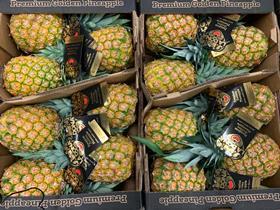
La Dona Fruit says customers can expect a sufficient supply of MD2 pineapples from Panama to satisfy European demand this summer, after adapting its business to mitigate the global coronavirus pandemic.
As well as renewing its GlobalGAP certification, the company has introduced additional strict hygiene measures to protect workers at its pineapple farm in La Chorrera, Panama. Where necessary, alternative airfreight and seafreight capacity has been secured quickly to guarantee the continuity of exports.
La Dona said it has managed to maintain consistent fruit quality and export volume thanks to the resilience and adaptability of its workforce and its leaders.
“Volume has remained pretty steady. We’re exporting over 60 tonnes of pineapples a week by air and sea to retailers and wholesalers across Europe,” said director of pineapple operations, Paul Vergara.
“In late March, we made a slight switch to more sea freight when air routes became temporarily unavailable. Since early May we’re back up to four flights a week.
“Air cargo space is limited out of Central America currently, but we’ve worked hard to negotiate space and rates. Now every KLM flight leaving Panama has some of our pineapples on board.”
Sales of the company’s plant-ripened, premium airfreighted pineapple have been growing steadily in Europe and the UAE. As the business expands, the team is evaluating sea freight technologies that would enable its high-colour, high-maturity pineapples to arrive in optimum condition by sea.
“During the first few weeks of June we will trial shipping highly-ripened pineapples under different ozone atmosphere conditions to gauge whether we can switch more airfreight volume to containers,” said Vergara.
“Nonetheless, we expect airfreight to return to normal by September as the airlines start to resume routes over the next two to three months.”
La Dona supplies golden pineapples year-round, with exports increasing by 30-40 per cent between September and December to satisfy Europe’s traditional peak in demand.
“It’s going to be a strange year, and difficult to predict week by week,” Vergara commented.
“Europeans usually consume local produce over the summer, while pineapple consumption rises again from September onwards. But anything could happen this summer, especially if some countries do have issues finding enough workers to pick local fruit. As always, at La Dona we remain ready to respond to any supply-demand situation in the market.”
In addition to renewing its GlobalGAP certificate, in late February La Dona’s pineapple farm in Panama achieved HACCP accreditation in official recognition of its social responsibility efforts. Next, the firm is exploring other standards, such as Primus and SMETA, in line with the growth of its European retail business.



